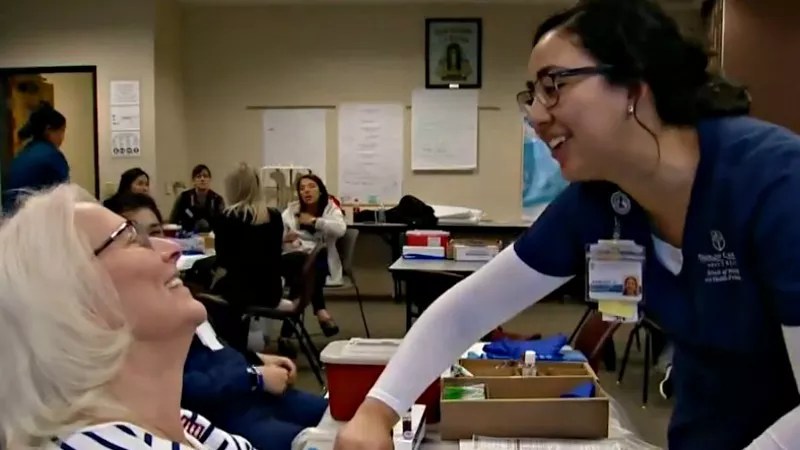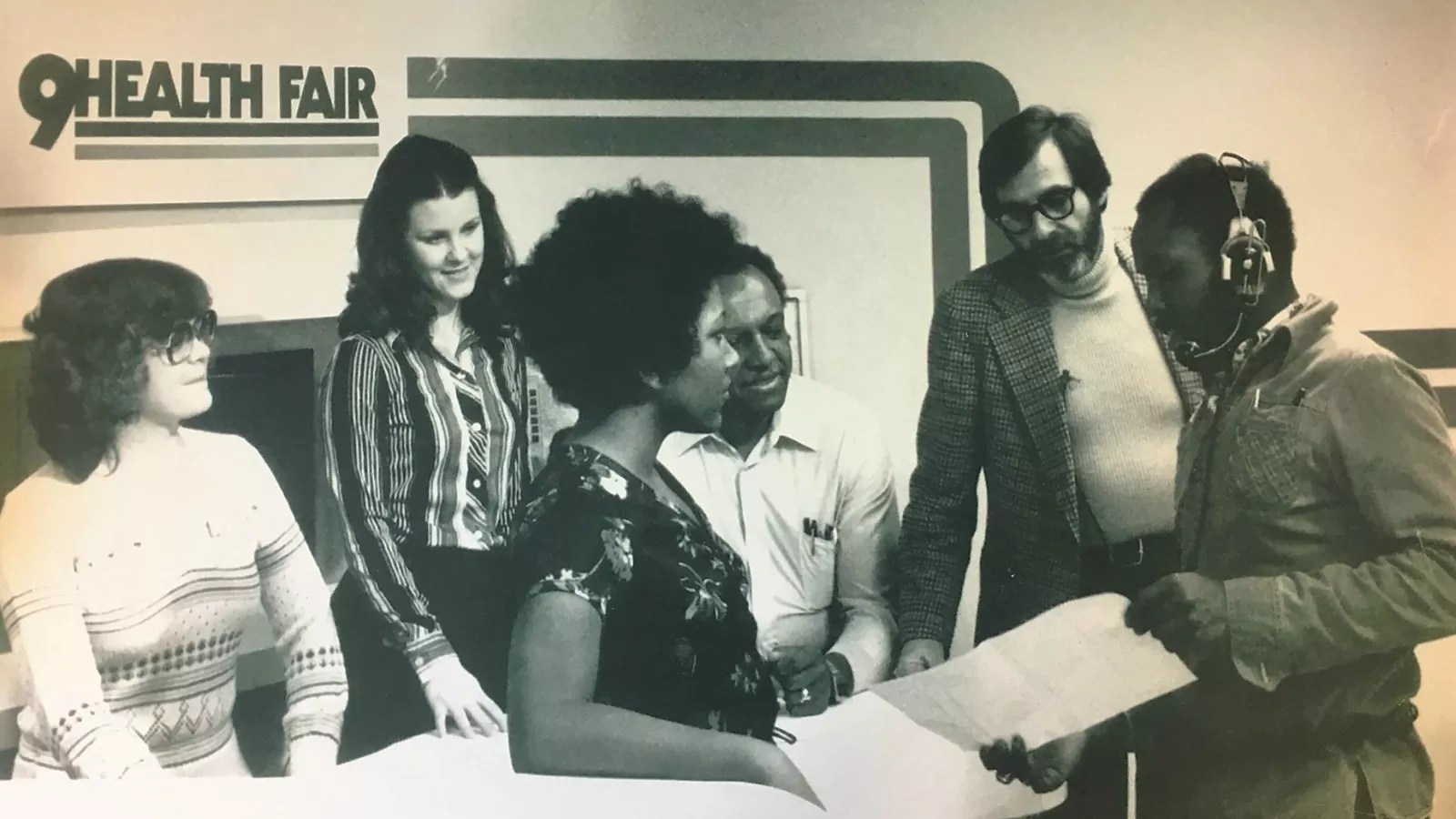
9Health Fair via YouTube

Audio By Carbonatix
For the first time in its forty-plus year history, 9Health Fair, Colorado’s largest and most sprawling semi-annual health-care event, has been postponed because of concerns over COVID-19, an infectious disease caused by a newly discovered type of coronavirus officially known as SARS-CoV-2. More than ninety fairs were expected to begin on March 27 in Las Animas County and continue across the state through early May, but now they won’t be happening as scheduled, and no new dates have been announced.
Marla Rodriguez, 9Health Fair’s vice president of communications, acknowledges that delaying these health checks has been especially wrenching because of what may be at stake for clients. “What we do at the 9Health Fair is preventative screening,” she notes, “and every year, we have a certain number of cases where, if we didn’t find what we found, that person wouldn’t have lived.” At the same time, however, “many of our participants are older, and many of them may have pre-existing health conditions” – the very type of folks for whom COVID-19 is thought to be most menacing.
Given that, 9Health organizers faced the cruelest of questions: Would they be putting more people in danger than they might be able to save?
The 9Health Fair was launched in 1979, and it successfully expanded the brand of 9News, its primary sponsor. But as Rodriguez points out, the fair is actually a separate entity designated as a 501(c)(3) nonprofit, and it’s fueled by an army of volunteers – whether medical professionals donating their time, or individuals simply lending a hand from a logistical standpoint. Today, fairs are held in the spring and the fall, and they offer free health screenings for adults and youth, as well as what are described as “affordable biometric screenings for adults eighteen and over.”
Over the four decades of the 9Health Fair, whose slogan is “Your path to healthy living starts here,” more than two million residents have been served in a wide variety of ways. Here’s a list of impacts from 2018:
• 119 locations in Colorado and surrounding states
• 15,000 volunteers donated $2.4 million worth of time and talent
• 42,407 28-component Blood Chemistry screenings
• 15,907 Blood Cell Count screenings
• 8,995 PSA screenings
• 13,548 Hemoglobin A1C screenings
• 9,623 Vitamin D screenings
• 10,603 Vitamin B12 screenings
• 6,972 Testosterone screenings
• 4,354 Colon Cancer screening take-home kits
• 2,035 personal critical or alert follow-up calls from medical professionals
• 1,950 free blood work vouchers used by underserved communities
Last week, Governor Jared Polis announced the first presumptive cases of COVID-19 – and there have been more since then, as detailed in the latest information from the Colorado Department of Public Health and Environment. As worries about the spread of the virus increased, 9Health boardmembers and administrators huddled with medical professionals, including Dr. Payal Kohli, 9News’s medical expert.
“She’s been advising us,” Rodriguez explains, “and we made the decision out of an abundance of caution. We focus on prevention and health awareness, and we felt the best way we could help people prevent any kind of risk was to not have them go to a public place right now.”
Another issue was that “we have medical professionals volunteering their time to do health screenings, and knowing they might be called elsewhere in the coming months and weeks was another big consideration,” Rodriguez adds. “We wanted to be respectful of volunteers and the medical needs of the community that we can’t anticipate. We don’t know what’s going to happen next with the virus. Nobody knows what’s going to happen. So we wanted to take these proactive steps to protect everybody.”
Finding new dates for the spring fair won’t be easy. As Rodriguez points out, “A lot of the sites that have opened their spaces to the 9Health Fair over the years are scheduled a year in advance. You get your date and that’s it. Some places are already saying, ‘We’d like to run in the fall. Tell us when you’d like to schedule.’ So we know there’s interest, but we don’t know what the situation is going to be like.”

A photo from the early days of the 9Health Fair.
In the interim, 9Health Fair crew members will attempt to provide as much information as possible on their website, and plans are also in the works to distribute mail-in screening kits from Quest Diagnostics, though it’s likely to take a couple of months. “We’re also going to do call-ins every day on 9News,” Rodriguez reveals. “We’re really trying to step up our education and the opportunity for people to ask questions and interact with us during this time.”
Rodriguez confirms, “This has been really hard for us, and we’re looking for things we can do to help people – because that’s our mission, and we take it very seriously.”
On March 9, the CDPHE identified “two new presumptive cases of COVID-19, based on 21 tests completed between 10 a.m. and 2:30 p.m.” There was also another case that “resulted in two separate indeterminate results; this means that the test did not provide conclusive results.” That brings the total of presumptive positives in Colorado to twelve, not counting the indeterminate case.
The positive cases involve a female resident of Eagle County in her seventies who had no known contact with an infected person but has a recent history of travel in the U.S., and a woman in her thirties from Denver with a similar background. The indeterminate case involves a Denver woman in her seventies whose possible exposure is under investigation.
Here’s the latest release from the CDPHE, issued on March 9.
Clarity on State Health Department’s role in testing for COVID-19
Colorado Department of Public Health and Environment administrative offices in Glendale do NOT test for COVID-19.
The Colorado Department of Public Health and Environment is providing clarity on its role in testing patients for COVID-19. Some members of the public have mistakenly tried to access services at the state health department’s administrative offices in Glendale, which does not provide clinical services. If a person is exhibiting symptoms, the person should go to a medical provider, like a clinic or hospital, ONLY AFTER calling the provider. If appropriate, the provider will give them instructions on where to go to for care and testing.
If a person is exhibiting symptoms of COVID-19, like a fever, coughing, or shortness of breath, and has not yet been tested, the following steps are advised:
1. The person should abstain from all public gatherings.
2. The person should increase distance from close contacts. Six feet is a distance that reduces risk of transmission of the virus, spread mainly through coughing and sneezing.
3. The person should continue to practice basic hygiene like hand-washing with soap and water; in the absence of soap and water, use hand-sanitizer with at least 60% alcohol; cover coughs and sneezes with a tissue, then throw the tissue in the trash; avoid touching your eyes, nose, and mouth with unwashed hands.
4. The person should call a medical provider or nursing line BEFORE going into a health facility.
5. If instructed to seek care, follow the precautionary advice of the medical provider BEFORE going into any health facility.
6. The medical provider will evaluate the patient and determine if testing is needed for influenza, other respiratory illness, and COVID-19.
7. If a patient needs to be tested for COVID-19, the medical provider will collect a specimen from the patient’s nose and throat and send the samples to the state lab or a commercial lab that is capable of doing COVID-19 testing.
8. The state lab must prioritize tests that meet the current criteria:
a. The patient has a fever OR signs/symptoms of lower respiratory illness, such as cough or shortness of breath, AND the patient has been in close contact with someone confirmed with COVID-19, within 14 days of when symptoms started.
b. The patient has a fever OR signs/symptoms of lower respiratory illness (and other diagnoses such as influenza have been ruled out), AND the patient recently traveled to parts of the world where infection rates are high or community spread is occurring, within 14 days of when symptoms started.
c. Severe acute lower respiratory illness (e.g., pneumonia, ARDS) requiring hospitalization and without alternative explanatory diagnosis (e.g., influenza)The criteria are subject to changes. For the most up-to-date information visit the website.
The state lab doesn’t charge for the actual laboratory testing of specimens, and the governor has ordered health insurers to eliminate costs for people to get examined for COVID-19. For people who are uninsured or undocumented, the state continues to explore options.
Additional clarifying information on tests:
• The state is expecting 700 more test kits from the CDC, and it currently has 900.
• The state lab has the capacity to do 160 COVID-19 tests per day, but must prioritize testing specimens that meet the current criteria.
• State lab practice is to test two specimen samples per patient, which requires two tests.
• The state is working on increasing testing capacity.
Coloradans can take basic preventive steps to protect themselves from COVID-19:
• Practice good hygiene. Thoroughly wash your hands with soap and water; in the absence of soap and water, use hand-sanitizer with at least 60% alcohol; cover coughs and sneezes with a tissue, then throw the tissue in the trash; avoid touching your eyes, nose and mouth with unwashed hands.
• Stay home if you’re sick; keep your children home if they are sick.
• Stay informed with reliable, up-to-date information. People who have general questions about coronavirus disease 2019, can call CO HELP at 303-389-1687 or 1-877-462-2911 or email them at COHELP@RMPDC.org, for answers in English and Spanish (Español), Mandarin, and more.
• Be prepared. FEMA guidance for pre-pandemic COVID-19 preparedness is available on Ready.gov. Helpful information about getting your household ready for coronavirus is available on CDC’s website here.
As for the 9Health Fair, refunds are being offered for anyone who’s already purchased screenings; contact client.services@9healthfair.org or call 303-698-4455 for details.